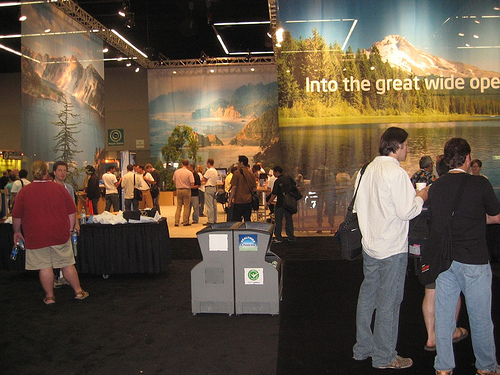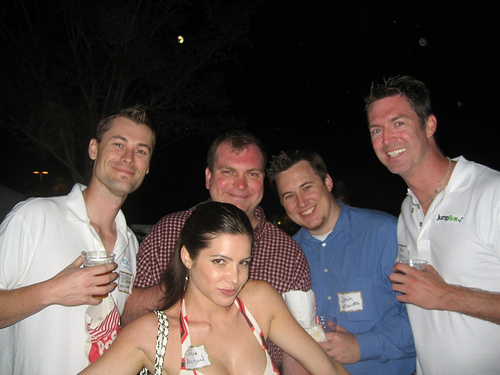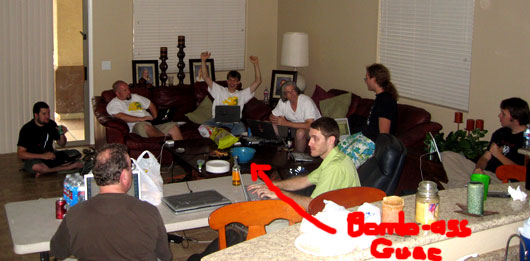Between attending OSCON in Portland last week, doing the TechCrunch demo pod at the party on Friday in SF and doing our production release and launching sales for JumpBox, it’s been a whirlwind the past few weeks. Here’s a recap some of the highlights:
1.0 Launch Madness
It was a crazy scramble right up until we left for Portland. Not only were we changing our corporate identity, building the online store and payment gateway, porting our site over from WordPress to Drupal, revving the applications to their latest versions, and putting the finishing polish on the JumpBox platform itself but we were also prepping for our presence at the conference and TechCrunch party getting new shirts/biz cards/DVD’s made. It was a stressful week leading up to OSCON but we launched sales officially last Tuesday and saw a record day for downloads. Sales velocity has been improving slowly and we’re putting better and better metrics in place as we go to confirm/refute hypotheses about what is working well and where the bottlenecks are. One of the sessions at OSCON was titled “How to change your tires at 100mph” and I feel to some extent that’s us right now- we’re now finally on the racetrack and we’re converting our yugo into a formula one as we drive. True to 37 signals form of “it’s not a problem until it’s a problem“, we deferred the aspects of the system that didn’t need to work immediately. All in all, we’re happy with the progress of things and as we anticipated, the pace of learning has accelerated greatly now that we have customers and a better idea of our conversions.
Portland and mass transit
We were in Portland for OSCON last week and that was my first time in that city. The weather was a treat after our 117deg days here in Phoenix. The feature that stood out most about their city is that they have mass transit absolutely nailed. Trains and buses are everywhere and come frequently and a good number of people seemed to ride them. Phoenix has been torn up the past year as they build our light rail. I hate to be pessimistic but frankly, I don’t see it working in Phx. Waiting in the heat would be enough to deter most travelers from using it, but they also traverse the first and last mile to the train stops somehow. Rail is a transportation medium that is hugely subject to network effects (ie. the first train is marginally valuable, the second makes it significantly more valuable and a grid of trains running makes it extremely valuable)- one rail stretched across the city is only mildly useful unless it integrates well with the bus system. If it’s going to see adoption at all in Phoenix, they’ll need to solve the cooling issue at the stop and last mile issue. The fact they chose to route it around Sky Harbor airport so they could continue to bill $20/day for parking makes the program pretty irritating. Provided they can fix the cooling issue at the stops and make it work, we’ll see an industry of smart car rentals (or an equivalent short-hop transportation option) spring up around the light rall stations and that should be an interesting opportunity for someone.
OSCON
The open source conference was well-attended. I heard the figure of 2500 attendees and that seemed about right. I didn’t know what to expect about what the audience make up would be like- it was heavily slanted towards developers. We did informal counts of Mac v. PC laptops at the couches and meeting areas and noticed that Mac has clearly overtaken PC in the developer community. I attended sessions on foundations of OSS, law as it relates to OSS, jabber, subversion, Trac, how Youtube scaled to meet their insane growth, the Art of Community, promoting an open source project, myths of innovation and lessons in usability. The innovation seminar was probably the most interesting- the guy was author of this book and was a great speaker. I realize the developer-level stuff is now officially way over my head and I’m relegated to the ranks of normal end user. We met with some cool people at the conference and saw an awesome duo guitar performance at the Intel booth on the last day. I’m actually happy we didn’t end up doing a booth there, however. It’s just the wrong venue to promote JumpBox.

The intel booth was impressive.
TechCrunch
We did a product level sponsorship at the now-famous TechCrunch annual party hosted by August Capital. There was apparently all kinds of drama surrounding this girl and she was certainly quick to hop in our photo (check the Sandra Bullock resemblance):

It was good seeing our friend Shanti Braford (red checkered shirt) who recently left Phoenix to be in the tech mix up in SF. And big thanks to Josh Strebel (left) for saving our ass and running errands for us while we were stuck in Portland after Alaskan Airlines canceled our flight. The other guy in the picture above is our AZ friend Josh Knowles (blue shirt) who also came to party with us.
Books
I’ve had a chance to finally read a bit now that we’ve launched. I’ll try and writeup individual posts with the takeaways for each book but here’s the gist:
Anatomy of Buzz – nothing earth-shattering here if you’ve read Seth Godin and Malcolm Gladwell stuff but it’s decent as an overview of the mechanics of how buzz travels. There’s a 20pg assessment at the end that makes a nice summary and gives you a checklist to assess your company’s marketing efforts.
Freakonomics – I’m way behind the times with this one but it was a carpet ride through the underbelly of different industries exploring why strange anomalies occur. Understanding corruption in sumo wrestling, learning why so many teachers in the Chicago public school system were cheating to enhance their students’ test scores, and a windfall study on the accounting books from the largest documented drug ring. This author took a subject as dry as Econ and made it intensely interesting by distilling it down to one thing: incentives.
Startup – Great read for anyone doing a startup of their own. This makes me feel like ours is peanuts in the face of the high stakes with GO corporation and Penpoint. Lots of lessons with regards to raising money and deal negotiations- I’ll write this one up soon.
Movies
Last King of Scotland – Forest Whittaker gave a killer performance in this movie and looks eerily like Idi Amin. Go rent this one.
The Guardian – I know, I know. Ashton Kutcher… dude where’s my car? This movie was great though- it was Top Gun for the Coast Guard. I haven’t teared up from a movie in a long time but this one did it (btw my brother sent me this and cast Top Gun in a whole new light- we had been reciting Top Gun dialogue at a pool party the other week and this clip makes it considerably less-badass).
10 mph – shortly after I quit my corporate grind job 2yrs ago, my roommates at the time who worked in the same company quit and rode a segway scooter across the US and filmed a documentary. This is worth it for the photography alone and Hunter and Josh are hilarious. It’s cool to see that they’ve won a few awards with it. They’re now working on the next one that has something to do with fantasy football.
Bella – we’re going to a screening of this indie film on Aug 13th and the trailer looks awesome. If you’re in Phx and would like to attend, lemmeknow and I can probably get you in.
Bands
Between catching some random shows, Last.FM and friend recommendations, there’s a ton of great music I’ve discovered recently.
Spoon – good european sound with tinges of Jet and Wolfmother.
Ben Lee – incredible young songwriter. Reminds me of the singer from Small 23.
Brand New– we saw these guys perform in Phoenix a few months ago and I’ve never seen so many fans singing along at a show. Their sound was infectious had huge crowd energy. We ended up covering “The Quiet Things” at our last show.
Joe Purdy – solid acoustic songwriter.
Bright Eyes – singer sounds like a lamb sometimes but their lyrics and songs get stuck in your head for days. Their Poison Oak track is powerful.
Kevin Devine – Find of the month. Happened to see these guys open up for Brand New and they blew me away. Get either one of their albums.
Donovan Frankenreiter – Jack Johnson-esque chill sound.
JVA – unfortunately their CD is way over-produced and doesn’t do them justice. We saw them perform live at the Intel booth at OSCON and they were terrific musicians.
Menomena – caught them randomly at the Mozilla party at OSCON. They have a strange and beautiful sound as if TV on the Radio crashed into Pinback while learning music theory from Phish and taking singing lessons from Bare Naked Ladies. Actually, I change my mind- these guys are the find of the month. If you buy one album this month, get their Friend and Foe release.
Podcasts
Jehane Noujaim – an amazing proposed idea for bridging cultural gaps through a day of shared cinema around the globe.
TalkCrunch – I’ve listened to a bunch of TalkCrunch interviews and they’re good. Arrington presses guests for information to the point of it being uncomfortable but he does get a lot of answers. The Zimbra one was very interesting.
Venture Voice – the interview with the DoubleClick and Shopwiki CEO was solid.
Grid7 – not to toot our own horn here but we’ve had some good guests on the Grid7 podcast lately. I really enjoyed talking with Adam of Inkling Markets. We should have two very interesting guests coming on soon… stay tuned for that.
So Close
Lastly, I placed 2nd in the last Ideawarz tournament on Cambrian House. I should be happy with that standing given that there were 50 entrants but I’m bummed about the idea that won. It was essentially a rehash of the CH concept itself and though it’s a noble cause that I support, it’s not nearly as interesting (or feasible) as the AdSqueeze concept. I’m realizing more and more that the ideas that consistently do well on there are something like “Solve world hunger via crowdsourcing.” They propose vague, honorable goals but no realistic means to achieve them; tacking on the crowdsourcing adjective almost invariably secures you a slot in the top three. I’m concerned about the future of CH and that they’re encountering the same fatal flaw that killed Grid7 labs: people who are paid solely in equity who are not truly on the hook to deliver in the end will fail to do so. I feel like they’re getting spun out on their engine/processes instead of ensuring they produce a few successes. I do have a recommendation for them on what they need to change at this point and I’ll write that up soon. I know they’ve had some cuts lately and are down to around 25 people – I genuinely like this company though and I really want to see the co-op concept made to work. They basically need to incorporate the concept of microfinance into their model to infuse real cash into the system (however small) and get the accountability hook of real money changing hands to work for each project. Make it a place where anyone with disposable income can go to back risky ideas that can be tested quickly with minute amounts of cash.
Anyways, that’s the haps on the craps and bring you up to speed on what’s been happening here this summer. We’re hiring for a QA position, a contract graphic designer position and a Ruby on Rails rockstar for JumpBox. Contact me if you fit the bill or know anyone who does.










